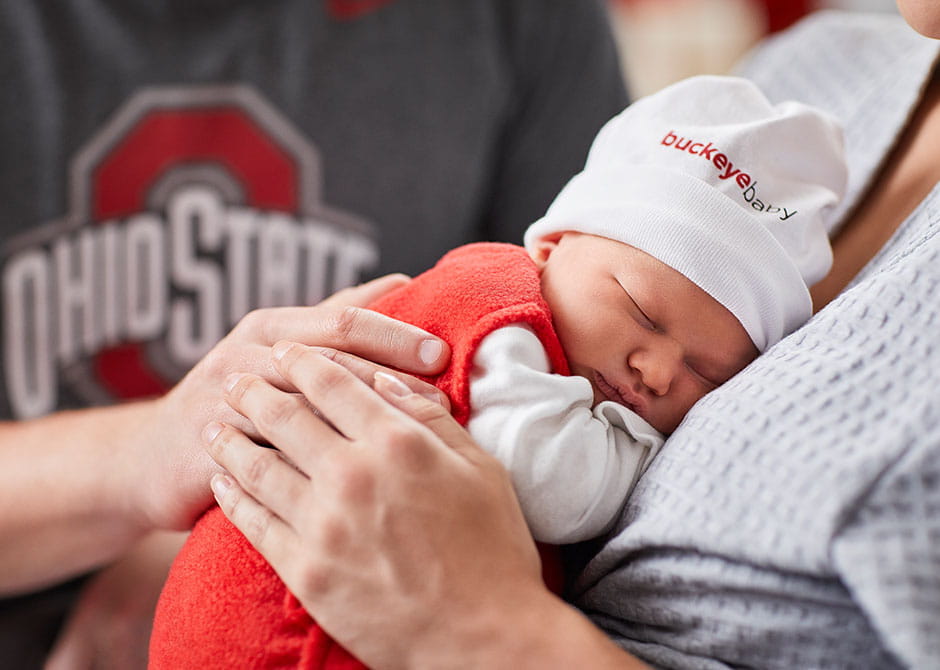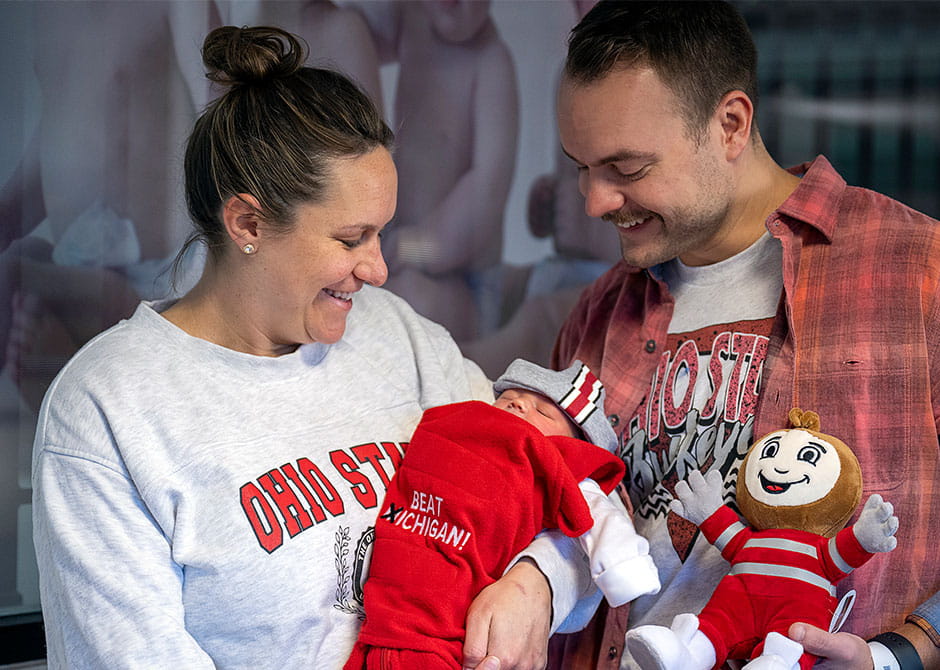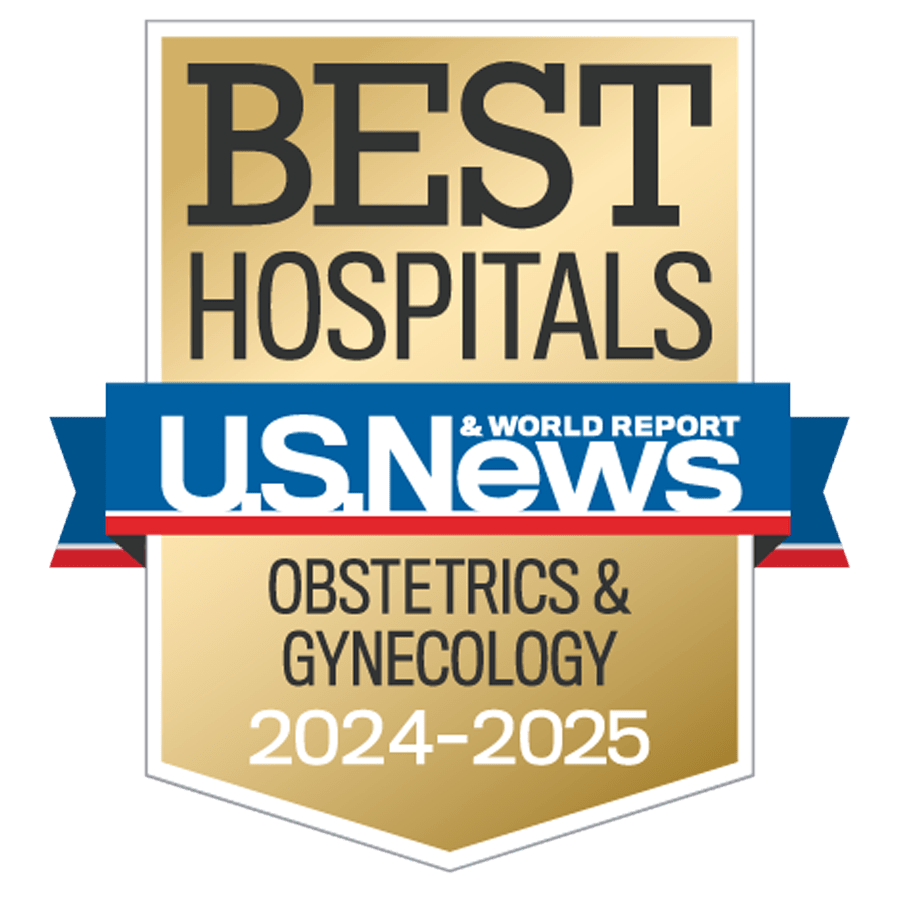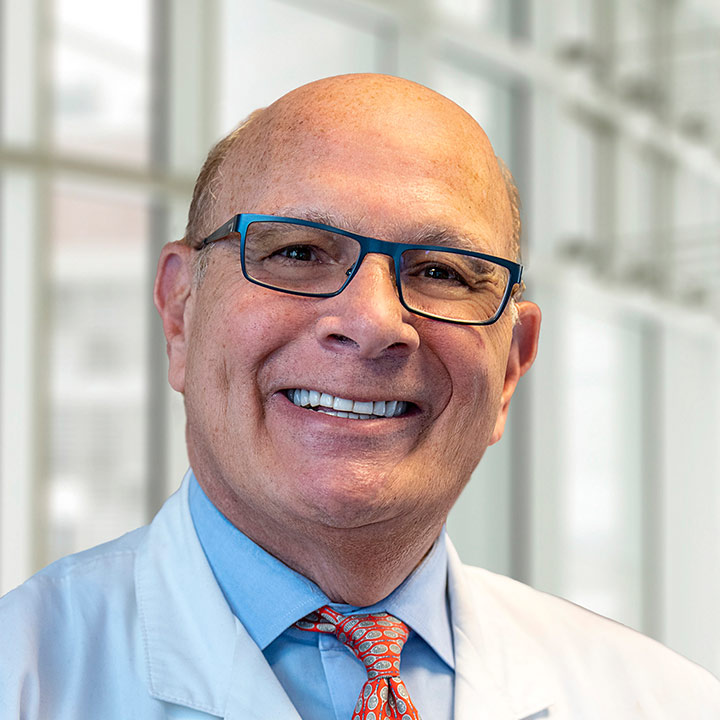If you have or develop type 1 diabetes, type 2 diabetes or gestational diabetes mellitus (GDM), the Diabetes in Pregnancy Program at The Ohio State University Wexner Medical Center can help you safely carry and deliver a healthy baby. Our program has served individuals from across central and southern Ohio since 1987, making it one of the oldest and largest integrated and coordinated diabetes and prenatal care programs in the nation.
Our goal is to keep your blood sugar levels as close to normal as possible through personalized care that is coordinated across a team of specialists. We help you accomplish this through:- Education
- Encouragement
- Glucose monitoring
- Insulin management
- Ongoing health checks before, during and after pregnancy
- Close partnership with your other health care providers
Partners in care
We understand that it can seem overwhelming to manage your own health while worrying about a developing baby too. That’s why we work closely with your referring Ob/Gyn, midwife or medical endocrinologist to create a personalized plan for each stage of your pregnancy with diabetes.
Because women living with diabetes know they’re at high risk for complications if they become pregnant, they often come to us before, or at the beginning of, their pregnancy. However, we’re also ready to step in later or if you develop diabetes during pregnancy.
How we work together
Most people continue prenatal appointments with their regular Ob/Gyn or midwife, while the experts at Ohio State Maternal Fetal Medicine (MFM) manage their diabetes and any related medical conditions, including hypertension, thyroid conditions and diseases of the eyes, heart and kidneys. Our program also provides comprehensive diabetes-in-pregnancy care that addresses social support needs and nutrition services.
- You’ll send a weekly glucose monitoring log to Ohio State MFM so we can review results and recommend any needed adjustments to medication or management in real time. Newer technologies, like continuous glucose monitoring, let us remotely access data in real time.
- About every four weeks, we schedule an in-person appointment for an ultrasound and comprehensive checkup with our team that includes a visit with your MFM doctor and nurse.
- As the baby’s due date approaches, we’ll discuss with you and your primary Ob/Gyn provider whether delivery should be planned at Ohio State or if it’s considered safe to deliver closer to home at a local hospital.
- Every aspect of your care throughout pregnancy will be shared between your regular Ob/Gyn provider and our program, so everyone will know of any changes in your health.
- We aim to transition postpartum care back to a primary care provider or endocrinologist based on your preferences.
Whenever our partnership starts, we have the information and resources you need to better manage your own health. More control leads to less worry—allowing you to enjoy the journey of pregnancy.
For Current Patients
Contact information for questions and blood sugar reporting
McCampbell Outpatient Care OSUbloodsugar@osumc.eduDiabetes number: 614-293-4887
Main number: 614-293-8045
Outpatient Care East
EastMFMdiabeticeducation@osumc.edu
Main number: 614-293-2222
Outpatient Care Upper Arlington
mfmdiabeticeducation@osumc.edu
Diabetes number: 614-293-4877
Main number: 614-293-2222
Highlights of the Diabetes in Pregnancy Program
The sooner we stabilize glucose levels, the lower the risks become to both you and your baby. To accomplish this, we tackle issues from several different sides, always tailoring your care to your individual situation. Here are some of the highlights of our program.

Specialized care
You’ll receive science-based medical recommendations from Maternal Fetal Medicine experts with support from endocrinologists and other specialists as needed, all of whom have decades of patient care and research experience related to diabetes in pregnancy.
Preconception consultation
Along with your primary care physician, we’ll help you with family planning and work with you to improve your health before you become pregnant.
Diabetes education
A dietitian and a certified diabetes educator will share more about managing your condition through optimal diet, exercise, self-monitoring of your glucose and, if necessary, medication.
Diabetes tests and monitoring
We use the latest technology to:
- Screen for gestational diabetes
- Monitor blood glucose values (which may include the use of continuous glucose monitoring)
- Deliver insulin (which may include the use of pump devices)
- Maintain or improve the health of both you and the baby
Why Choose Ohio State
You’ll have an entire team of medical experts supporting you. Our Diabetes in Pregnancy Program cares for more than 800 pregnant women every year, and our researchers are always working on new clinical trials to improve outcomes. Established in 1987, this specialized program provides the latest evidence-based, personalized care to address gestational and other types of diabetes as well as to your unique prenatal needs.
Here at The Ohio State University, you’ll get the benefit of our leading edge-research. As a major recipient of funding for diabetes research in pregnancy from the National Institutes of Health (NIH), Ohio State leads some of the largest clinical trials focused on diabetes management in pregnancy. This includes:
- A gestational diabetes mellitus study with the Maternal-Fetal Medicine Units Network led by Mark Landon, MD.
- The ACHIEVE trial with Kartik Venkatesh, MD, PhD, which explores the impact of addressing unmet social needs and using a novel mobile device and continuous glucose monitoring to improve glycemic control among a high-risk population of pregnant people with type 2 diabetes.
Our clinic provides ongoing prenatal care, co-manages patient care with other physicians or is available for consultations for patients from central Ohio or across the state.
Common diabetes screening tests and treatment
Using the latest advancements to protect pregnancies
The Diabetes in Pregnancy Program at The Ohio State University Wexner Medical Center uses the most effective methods for detecting and treating diabetes. Depending on your health needs, we may recommend any of the following:
- Glucose test
Also known as a glucose challenge or tolerance test, this screens for gestational diabetes, usually between 24 and 28 weeks of pregnancy. - Regular glucose reviews, which may include the use of continuous glucose monitors
A physician will review your glucose monitoring log to start or adjust medication, as needed. If you need to begin taking insulin or another oral diabetes medication, you’ll learn how during a one-on-one education session with our diabetes nurse. - Ultrasound
A level 2 (targeted anatomy) ultrasound is done at 18-20 weeks to check for possible abnormalities and birth defects, such as cardiac malformations and other structural defects that can be related to your diabetes. - Fetal echocardiogram
This in-office screening late in the second trimester is done by a pediatric cardiologist. It checks the structure and function of the baby’s heart before birth and for the presence of heart defects. - Insulin pumps and continuous glucose monitoring sensors
Our team is comfortable managing diabetes in pregnancy with the latest technologies, including continuous glucose monitors and insulin pumps. These advanced technologies allow continuous insulin doses and they deliver accurate, timely glucose measurements so we can quickly identify issues and adjust our approach. - Postdelivery glucose testing and continuity of postpartum diabetes care
Expectant women with gestational diabetes are seven times more likely to develop type 2 diabetes later in life. We can test for it 6-12 weeks after delivery and refer you to an endocrinologist as needed.
For our patients with type 1 or type 2 diabetes, we strive for seamless transition from our program back to a primary care provider and endocrinologist for further management.
Helpful patient resources
Diabetes Nurse Educators
Lisa Buccilla, RN
I started my nursing career in Labor and Delivery after receiving my education at Mount Carmel School of Nursing. I’ve been with Ohio State Maternal Fetal Medicine for the last 13 years. I’m passionate and dedicated to providing quality care for each of my patients and their families all while remaining mindful of their individual preferences and needs. I am grateful to be surrounded by a team of highly qualified professionals to be able to tailor care accordingly.
In my downtime, I mostly enjoy time with my family and friends. I love traveling, especially to warm places, listening to live music, football and gardening.
Bridget Iadicicco, RN
I started my nursing career as an labor and delivery nurse on a very busy unit in Pittsburgh, which laid the foundation of my love for Obstetrics. I enjoyed helping families through some of the most challenging and crucial times of their lives. I left beside nursing to pursue a career shift to community health/home care for Ob. It was through that time that I found my passion for teaching and education. I find it rewarding to help families navigate the challenges they are faced with during their pregnancies. They say nursing is a calling, and I am glad my calling is here at Ohio State.
In my personal time, I enjoy paddle boarding and any water activities. I am a pet mom to Felix (dog) and Deekon and Faith (cats).
Melissa Rainier, RN
My career began as a nurse in the Neonatal Intensive Care Unit (NICU). I joined the team at Ohio State Maternal Fetal Medicine in 2020, and the best part of my job is helping women optimize their health and the health of their baby, both during pregnancy and beyond.
Outside of work, I enjoy traveling and spending time with my family. My husband and I have a son and two cats.
Julie Somppi, RN
As a diabetes nurse specializing in diabetes education in pregnancy, I collaborate with our physicians to help achieve the best possible outcomes for moms and babies. I work with a team that helps patients manage their blood sugar during pregnancy. I enjoy helping patients learn to manage blood sugar in order to prevent potential complications during pregnancy and delivery.
In my free time I enjoy spending time with my husband and two children. We love traveling, especially to Disney World and Washington, D.C. You can also find me searching for beach glass on Lake Erie. I also enjoy being creative with crafting and photography.
Brenda Widmayer, RN
I became interested in becoming a diabetes nurse educator at Maternal Fetal Medicine after I experienced gestational diabetes in my second pregnancy. I’m passionate about reducing the lifetime complications associated with diabetes and about lowering our patients’ risks for developing type 2 diabetes during their life. I hope to have an impact on lowering the incidence of type 2 diabetes, as it has become a global epidemic.
In my spare time, I love spending time with my grandchildren. I like to stay active walking with friends and taking fitness classes. I also enjoy reading, especially at the beach with my toes and the sand.
Dedicated Program Nurse
Kori Fenner, MHI, BSN, RN, OCN
I am the Nurse Manager for Maternal Fetal Medicine, and I’m passionate about supporting our nurses so they can provide high-quality care that results in the best possible patient outcomes. Our nurses are enthusiastic about and committed to staying abreast of the current research and technology that guides our management of diabetes in pregnancy.









